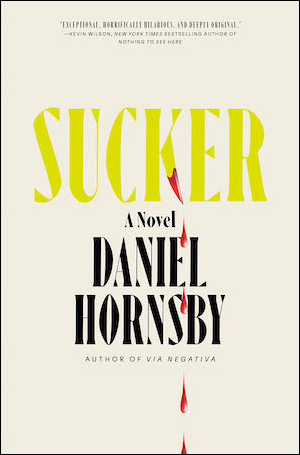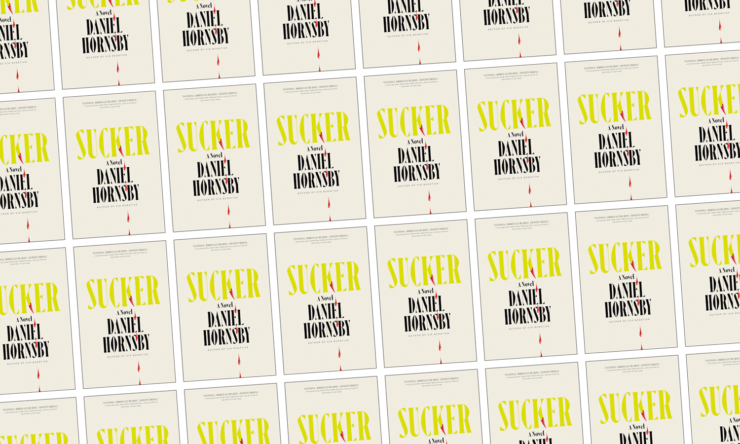Harvard dropout Olivia Watts is the darling of the startup world. With her biotech company Kenosis, she promises a tiny implant that, with just one sample of blood, can detect any treatable illness. But it turns out that Kenosis’s research is strange and dead-ended, that its implants can’t do what Watts claims they can, and that its million-dollar contracts are based on lies.
Sound familiar?
Sucker is a satire of the Silicon Valley hype and the ability of wealth to stave off truth. More specifically, it’s a satire of Theranos—the fraudulent diagnostic company that made billions of dollars claiming to be able to run comprehensive blood tests in under an hour—down to the minute details of its cast: Kenosis’s backers, defenders, and board members, just like Theranos’s, include a former Secretary of State as well as Gore’s lawyer from Bush v. Gore. Its lead scientist, Tim Murtane, is, like Ian Gibbons at Theranos, a Cambridge alum who tries to bring the company’s misdeeds to light.
Buy the Book


Sucker
Enter Chuck Gross, the son and namesake of his billionaire father Charles Grossheart. He runs a punk record label—horrendously unprofitable and “kept afloat only by parental subsidy”—but is forced to get a real job or be cut off. Olivia, his friend from Harvard, is happy to offer him a creative-consulting title at Kenosis, especially if it guarantees a little “parental subsidy” flowing towards Kenosis.
But Kenosis seems to have its own agenda. Almost immediately, one of Chuck’s musicians goes missing from a party, after Chuck tells Olivia that he’d “do anything to get rid of this guy.” The last Chuck sees of him, he looks bloodless and pale as Olivia promises to get him home. His first day on Kenosis’s campus, Chuck stumbles upon a darkened floor filled with humming machines and bags of blood scattered across the server racks. The higher-ups at Kenosis aren’t just leeches bleeding their investors dry of cash—they’re something more sinister, more vampiric.
It’s certainly not Gothic castles and scarlet capes, but Hornsby does an excellent job of showing vampires that have truly adapted to the modern era, leaving behind their aristocratic titles for the roles of wealthy CEOs or oil barons. Sure, the dietary requirements (blood) are a hassle, but the twin delusory effects of money and vampire glamour are more than enough to overcome it. Even as he falls deeper into this world, though, Chuck is mostly oblivious to it all, and refuses to believe his friend Olivia could be involved.
Chuck may be our protagonist, after all, but he’s no hero. He grew up within a bubble of extreme wealth and has never escaped it; his cares, priorities and beliefs are inevitably colored by never being refused anything, being surrounded by people who believe they’re entitled to everything. In one scene, Chuck recounts how Olivia stole another student’s idea to win a philanthropy contest before blowing the money on shopping and weekend trips. Did she spend that money on him, too? “I don’t remember,” he says. “I don’t really keep track of those kinds of things.” Those moments, where Chuck is blithely ignorant of the petty, privileged amorality his anecdotes reveal, are Sucker’s best, the times when its satire is strongest and most cutting.
And there aren’t enough of them. Chuck is self-aware enough to snidely comment on his wealth: His narration is, as he says, “sprayed with a Grossheart Industries polymer coating of self-protective irony.” They’re funny lines that Hornsby clearly had fun writing, mixing an eclectic style of Harvard-educated lingo and punk rock sensibilities—but these asides also undercut the book’s satire.
As The Onion put it (in an amicus brief to the Supreme Court): “Some forms of comedy don’t work unless the comedian is able to tell the joke with a straight face. Parody is the quintessential example. Parodists intentionally inhabit the rhetorical form of their target in order to exaggerate or implode it—and by doing so demonstrate the target’s illogic or absurdity.” To point out the farce “would have disarmed the power that comes with a form devouring itself.”
Chuck is, inescapably, part of what Sucker is satirizing, the generational wealth to Olivia’s heady, permanent-growth venture capital. Chuck and his skewed worldview is the means by which Sucker can build up a farcical evil company and make it all seem plausible, by which the corruption and bribery and TED-talk patter seem like perfectly reasonable defenses. His acceptance of these practices as the normal conduct of the wealthy is what allows Sucker to be absurd without feeling overblown or mocking. So the moments where Hornsby has him step outside that narrative and call himself a “scion fuckboy”—acknowledging his own position with a wink and a nod—snaps us out of this parodic form.
In the end, Sucker sets itself a hard task. The story of Theranos is already so ridiculous: a company claiming to do what any doctor said was physically impossible garnering billions from the richest and most politically powerful? But in its best scenes, it gives us a glimpse into how such a blatant scam, well, suckered, people—and how something worse could do the same.
Sucker is published by Anchor Books.
Read an excerpt.
Charles Bonkowsky is the president of Columbia University’s Science Fiction Society and loves talking to people about books.










